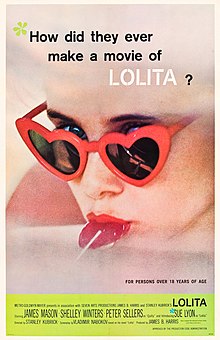This article has multiple issues. Please help improve it or discuss these issues on the talk page. (Learn how and when to remove these messages)
|
| Lolita | |
|---|---|
 Theatrical release poster | |
| Directed by | Stanley Kubrick |
| Screenplay by | Vladimir Nabokov[1][2] |
| Based on | Lolita by Vladimir Nabokov |
| Produced by | James B. Harris |
| Starring | |
| Cinematography | Oswald Morris |
| Edited by | Anthony Harvey |
| Music by | Nelson Riddle |
| Theme song by | Bob Harris |
Production companies |
|
| Distributed by | Metro-Goldwyn-Mayer |
Release date |
|
Running time | 152 minutes[7] |
| Countries |
|
| Language | English |
| Budget | $1.5–2 million[5][8] |
| Box office | $9.2 million[8] |
Lolita is a 1962 black comedy-psychological drama film[9] directed by Stanley Kubrick, based on the 1955 novel of the same name by Vladimir Nabokov.
The black-and-white film follows a middle-aged literature lecturer who writes as "Humbert" and has hebephilia. He is sexually infatuated with young, adolescent Dolores Haze (whom he calls "Lolita"). It stars James Mason as Humbert, Shelley Winters as Mrs. Haze, Peter Sellers as Quilty, and Sue Lyon (in her film debut) as Dolores "Lolita" Haze.
The novel was considered "unfilmable" when Kubrick acquired the rights around the time of its U.S. publication. Owing to restrictions imposed by the Motion Picture Production Code (1934–68), the film toned down the most provocative aspects, sometimes leaving much to the audience's imagination. Sue Lyon was 14 at the time of filming and played a 17-year-old, whereas the Lolita of Nabokov's novel is just 12 years old when Humbert Humbert first meets her.
Lolita polarized contemporary critics with its theme of child sexual abuse but was nominated for Best Adapted Screenplay at the 35th Academy Awards. Years after its release, Kubrick expressed doubt that he would have attempted to make the film had he fully understood how severe the censorship limitations on it would be. Regardless, the film has since received critical acclaim. In the late 1990s, British director Adrian Lyne again adapted the novel to the big screen.
- ^ Bailey, Blake (June 11, 2014). "Vladimir Nabokov's Unpublished 'Lolita' Screenplay Notes". Vice. Retrieved September 1, 2023.
- ^ Nabokov, Vladimir (August 26, 1997). Lolita: A Screenplay. Knopf Doubleday Publishing Group. ISBN 978-0-679-77255-2.
- ^ "SK – Stanley Kubrick Archive". archives.arts.ac.uk. University of the Arts London. Retrieved September 1, 2023.
Lolita (production Harris Kubrick Pictures, A.A. Productions, distributor Metro-Goldwyn-Mayer Inc.) followed in 1962, a time when content of the film still had the potential to offend censorship boards. Kubrick was acutely aware of this and its potential to damage commercial success and so the film was carefully crafted to avoid this. Lolita was also the first of Kubrick's films to be made in England, it was mainly filmed at MGM studios in Borehamwood. Initially Kubrick's move to the UK was financial, MGM had money that they had to spend on a UK film production.
- ^ "DS/UK/384". archives.arts.ac.uk. Retrieved September 1, 2023.
Kubrick company, only did Lolita
- ^ a b "Lolita". Catalog – American Film Institute. Retrieved November 27, 2020.
- ^ "Lolita (1962)". Movies & TV Dept. The New York Times. 2012. Archived from the original on November 3, 2012. Retrieved October 3, 2010.
- ^ "Lolita (1962)". Turner Classic Movies. Retrieved November 27, 2020.
- ^ a b Box Office Information for Lolita. The Numbers. Retrieved June 13, 2013.
- ^ "Lolita". AllMovie.